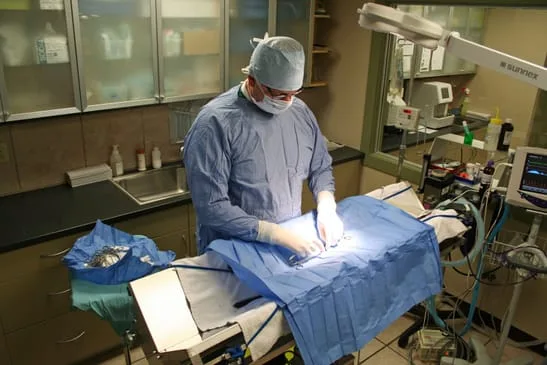The idea of surgery for your dog or cat is a stressful one for many of our pet owners. The doctors at New Canaan Veterinary Hospital have over 40 years combined experience in general surgery. In additional to routine spays and neuters, we commonly perform surgery to remove skin masses, abdominal surgery to remove tumors and gastrointestinal foreign bodies, and tissue collection necessary to diagnose and treat certain conditions. Also, for advanced procedures and orthopedic surgeries we are fortunate to consult with Dr. Melvin Pond, one of the most experienced and accomplished surgeons in the tri-state area. Dr. Pond will often perform his extensive surgical procedures in our hospital, as we feel that, whenever possible, our patients and clients benefit from having their pet's surgery done in the familiar, comforting environment of NCVH. In rare instances, especially when intensive overnight care is necessary, we may refer you to one of our local veterinary referral facilities.
As most clients, understandably, cannot appreciate what goes into the preparation and execution of a surgical procedure, we would like to detail the level of support and monitoring that Dr. Potenza and all our doctors insist upon to maximize our patients' comfort and safety. Please take into consideration the level of care we provide when making your decision about your pet's surgery.
At New Canaan Veterinary Hospital, each surgical patient receives:

- Intravenous fluid therapy through an indwelling catheter, regardless of age or relative risk factors
- Tracheal intubation for all general (gas) anesthetic procedures to ensure proper airway control
- Support of body temperature with circulating water blankets - one of the safest warming systems available. (Pets can be easily and severely burned by electric heating pads and they are not recommended.)
- Advanced anesthetic medications that are rapidly eliminated by the body so your pet is only anesthetized as long as absolutely necessary.
- Careful anesthetic monitoring by only our most experienced surgical technicians and/or by a doctor
- The most advanced anesthetic monitoring equipment which includes ECG, pulse oximetry (oxygen levels), monitoring of respiratory rate and blood pressure, and probably the most sensitive means of monitoring and adjusting anesthetic depth, capnography. Capnography is the measurement of inhaled and exhaled carbon dioxide levels, which often is the earliest indicator of anesthetic problems. Early detection allows adjustments to be made before serious issues develop.
- Careful monitoring of the patient AFTER the procedure, during the recovery phase from anesthesia. Careful hands on observation during this phase is crucial, as the monitors are disconnected and the pet seems to be awake, although body tempature may be low and the patient may not have full control of its vital functions
- Post operative pain medication and/or local nerve blocks as needed to continue to provide a pain free experience
- Pain medication as needed when pet is discharged from the hospital
